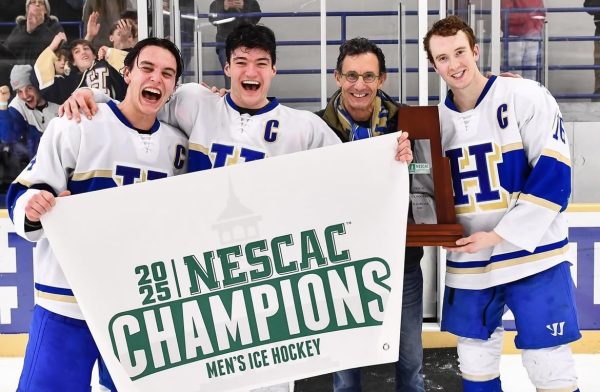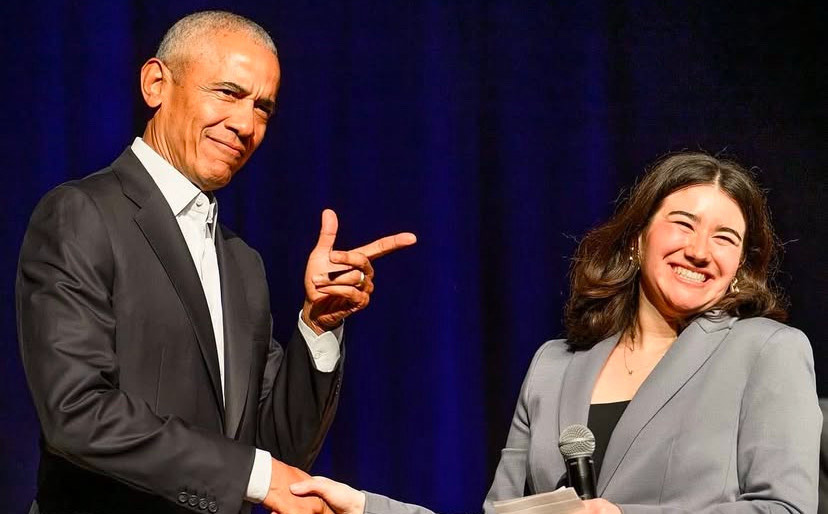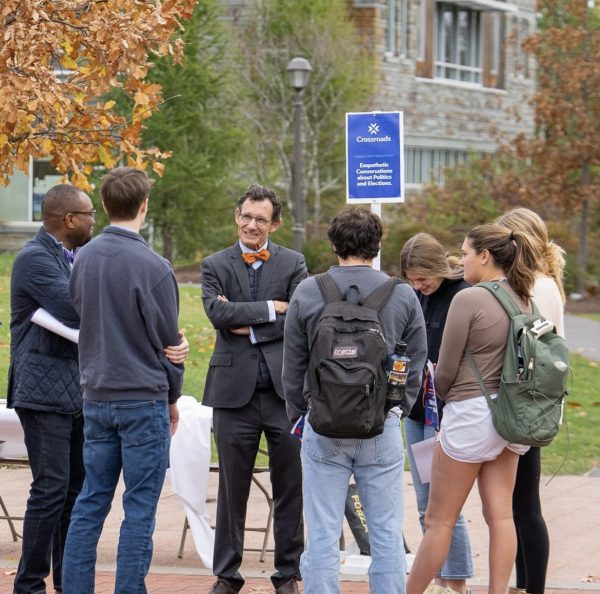
Since arriving on the Hill in June 2024, President Steven Tepper eagerly participated in campus activities, launched the “What If?” initiative and interviewed former President Barack Obama. At the same time, his first year coincided with a period of reckoning for higher learning institutions, including attacks from a new presidential administration and political discourse over conflict in the Middle East.
Reflecting on his mindset a year ago, President Tepper described feeling the nerves a person might feel before a first date, questioning whether the dynamic will be a good fit. He first got the sense that he and Hamilton were well-suited on move-in day. President Tepper described “screaming at the top of my lungs and just getting lost in that…seeing the families come up the hill and just thinking this is amazing.” Having a good fit, he said, opens “an opportunity for real authentic leadership.” After a year on campus, Tepper determined that the date was “very successful,” and feels like he and Hamilton are now going “pretty steady.”
The best aspect of his presidency so far has been interacting with students, he said. President Tepper described dancing with HEAT during his inauguration, cheering on student-athletes during games, sharing meals with ASU, Chabad, Hillel and MSA, and spending Thanksgiving with students. President Tepper enjoyed these moments of getting to connect with students, “getting to get a feel for the rhythm and energy of Hamilton and see why students love Hamilton.” He also appreciates that “students share freely” and he can “take critiques for how our institution could be better.” President Tepper was impressed with the caliber of students taking his course, The Stories We Tell: How Colleges Build Identity, Loyalty, and Distinction, saying he has never experienced students “that were more engaged and serious about investigating, interrogating, exploring ideas.”
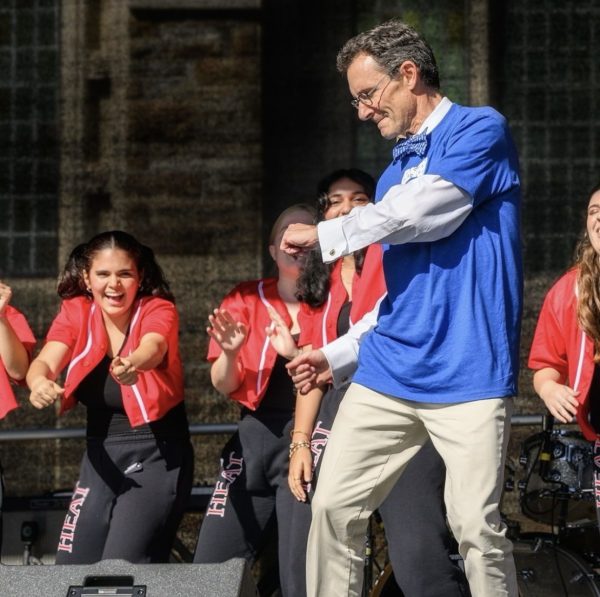
Regarding his relationship to the student-body, President Tepper said that his “biggest responsibility as president is to make sure the institution maximizes the full range of growth possible for every student.” This informs how he determines “where we can invest resources” and discovers “where there are barriers that, if we remove them, the amount that students could grow would be even greater.” He said this also requires supporting faculty whose expertise, research and craft serves as “key drivers” of growth for students. Tepper mentioned “helping and supporting [faculty] to build even more powerful relationships with students, more powerful opportunities to catalyze their classes, more resources, more time to invest in that work.”
While eager to discuss the positive moments he has had with students, President Tepper also acknowledged the challenges he has faced during his first year at Hamilton. The biggest challenge, he said, “at a place like Hamilton, people see the College as an extension of who they are,” including students and faculty. Tepper said that “everybody who is affiliated with it wants it to show up exactly how they would show up in the world, they want it to do what they would do.” So, when the College determines what it “does, what it says, how it shows up in the world,” the challenge is that the institution cannot always reflect what every individual wants it to say or do “and when there’s a gap, then people get frustrated,” he explained.
While Tepper identified these discrepancies as a challenge, he said “the good thing about the gap is that if people give voice to the gap, then you’re getting useful feedback on ways the institution might change.” Tepper continued, “the challenge is that you don’t want the dissatisfaction to get in the way of the learning.”
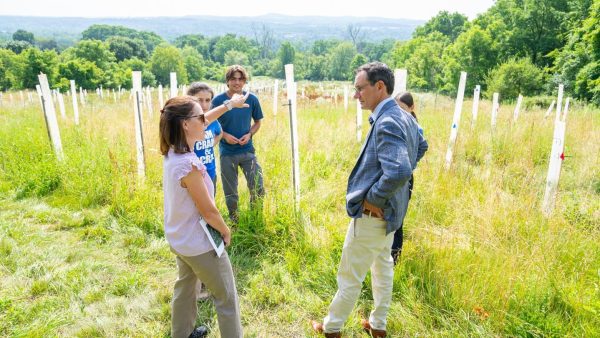
Addressing some of the recent attacks on higher education, Tepper said, “especially with an external world that’s also throwing things at us, distorting who we are, challenging some of our core values…there’s a balance in being aware of the gaps, aware of the external forces—all those things that create an unsettledness—and staying focused on the core thing we’re here to do.”
President Tepper was one of more than 150 college and university leaders who signed the April 22 AAC&U letter, “A Call for Constructive Engagement,” to protest the “unprecedented government overreach and political interference” toward higher education institutions. Reflecting on recent criticisms, Tepper shared “what I’ve come to realize in the last few weeks is that this entire conversation about our education…is missing student voices.” He suggested that “we need to build a national campaign where students are speaking for themselves,” answering questions like “do students feel silenced? Do students feel like they’re experiencing attempts at indoctrination? Do they feel like they’re not getting critical skills? Do they feel like if they disagree with a faculty member they can’t pose a question?” Tepper argued that “it’s a different story when you talk to students than what you hear pundits saying from the outside,” sharing that he asked these questions to the recent Phi Beta Kappa students who “felt like they were independent thinkers.”
Expanding beyond student voices to the larger question about the value of higher education, President Tepper said that Hamilton is “really good at telling the story to the true believers, and we’re not so good at telling the story to those who are skeptical.” He said there was a time when people—with or without diplomas—generally believed in college and might aspire to it for themselves or their families. “I think we’ve gotten to a place where there is not that feeling, and therefore the people who are not getting college diplomas, they’re not interested in just our positive stories,” like about sports teams, performing arts or museums. “They’re probably interested in how we’re going to help and I think that’s a slightly different position for colleges to be in,” he said. “That means we have to listen, we have to understand what our various communities need, we have to tell other people’s stories and we have to particularly reach out to those that might have different political beliefs and engage them and try to win folks back.”
Focusing on some of the changes he hopes to implement on campus, President Tepper shared his “what if” for student social life on campus—a source of frustration for many Hamilton students since COVID. Tepper asked, “what if the [Beinecke] village was one of the most social platforms ever conceived on a college campus?” He listed the five social spaces in the region, including the Little Pub, the Annex, the Events Barn, the Sadove Basement and a potential “dance space” in what used to be the mail center. He envisions a “social platform” that students could program and curate where every weekend students could “crawl from one to the other” and choose different types of music, fraternity or sorority events, a big event in the annex, game night or the pub. There are considerations of creating a responsible social culture, “the policies of who can drink and where should be enforced” and “the vision is that social life doesn’t get organized around socioeconomics,” Tepper said. “If we can get all that right and everybody agrees and we can invest the resources in making the village come alive, that would be amazing.”
When asked if there were any plans to bring back the late-night Jitney, Tepper said “another part of aspirational design is how the town of Clinton can be more part of campus life, so that could mean we have a physical presence downtown—Colgate has more physical presence in their downtown.” President Tepper mused on what the relationship between the College and Clinton could look like. “Do we have or are we operating a space downtown? Are we running the jitney late at night? We continue to be active in the farmers market and we volunteer…there should be a really powerful, mutually reinforcing, continuous flow of people and ideas between Clinton and the campus.” He did provide the caveat that “it’s not a college town” suggesting “there’ll be people who live in Clinton who do not want to hear that impression.”
Looking toward his future on the Hill, Tepper mentioned a few things he has yet to check off of his Hamilton bucket list: cross country skiing, performing another dance routine (with whichever organization asks him first), hiking in the Adirondacks, getting in a boat (not necessarily rowing it himself), eating at diner and maybe learning to juggle.
As President Tepper continues to get acclimated to Hamilton’s community, he will search for balance between the individual wishes of community members and the direction of the institution as a whole.
